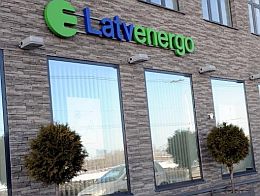Corruption, Energy, Financial Services, Latvia, Legislation
International Internet Magazine. Baltic States news & analytics
Thursday, 25.04.2024, 01:34
Huge amounts of money were transferred via offshore companies' accounts in Latvenergo
 Print version
Print version |
|---|
Investigators have not yet established where the money went after withdrawn from these companies' accounts, writes LETA.
"It was a well-working system, many years in operation. Quite creative too," said Rumjanceva.
According to Rumjanceva and her colleague Janis Baumanis, tracing the bribe money flows abroad was the most complicated part of the investigation. "Transferring money through numerous bank accounts via online banking may be very fast, while for us, it means countless requests for legal assistance."
Talks with companies' official representatives are usually useless, because they "have not heard nor seen anything". The best source of such information is various data storage devices – recordings of conversations, computers and documents seized by the authorities during searches, evidence given by other people.
The investigators say that European Anti-fraud Office helped them greatly with the investigation, also with the decryption of various encrypted files. Investigative activity spans a total of 14 countries.
As reported, the Corruption Prevention Bureau has forwarded to the Prosecutor General's Office a criminal case on bribery during the reconstruction of the Plavinas power plant and the Riga 2nd cogeneration plant, asking that 17 persons be held responsible.
The Corruption Prevention Bureau wants the prosecutor's office to charge four former Latvenergo officials with taking bribes, and two of them also with money laundering. The bureau also wants four authorized representatives from foreign companies to be charged with offering bribes, eight with money laundering, and one with aiding and abetting bribery.
According to the Corruption Prevention Bureau, Latvenergo officials and employees, in abuse of office and motivated by personal gain, accepted large bribes and, in turn, ensured that the company made decisions in favor of several foreign companies, registered in Spain, Turkey and Sweden, in several Latvenergo public procurement and reconstruction contracts. This is proven by evidence that the bureau's investigators found.
Based on consulting agreements signed by go-between companies and the foreign companies, Latvenergo officials and staff members were paid large amounts of money for signing contracts with the foreign companies, implementation of these contracts, and observing non-disclosure provisions stipulated in these contracts. The go-between in fact managed money that was to be given to Latvenergo officials for their illegal activity.
The bribery affair was implemented through a money laundering scheme via a number of companies registered in Latvia and abroad, which involved various money transfers, property deals and investments in companies that belonged to Latvenergo officials and the consulting company's owner.
The Corruption Prevention Bureau investigators have established that of EUR 178 million spent on the first round of reconstruction of the 2nd cogeneration plant Latvenergo officials and staff members received a bribe of no less than EUR 6 million altogether via a large number of companies registered in several countries. Reconstruction of Plavinas power plant cost EUR 32 million – of which a bribe of no less than EUR 1 million went to the perpetrators.
Also, they received about EUR 1.1 million bribe out of USD 57 million and EUR 289 million – the cost of the second round of the 2nd cogeneration plant reconstruction, but the largest part of the bribe, about EUR 11 million, was intercepted after several persons were detained within the Corruption Prevention Bureau's criminal case in June 2010.
During the investigation, the Corruption Prevention Bureau seized a total of about LVL 400,000 in cash.
Investigation in the case continued for two years, the materials in the case are comprised in 262 files. European Anti-fraud Office and authorities in many countries assisted the Corruption Prevention Bureau.
The Prosecutor General's Office is to take a decision today on further investigation in the case. In an interview with Latvian State Radio this morning, Prosecutor General Eriks Kalnmeiers declined to say if anyone would be charged in the case or if the case would be sent back to the Corruption Prevention Bureau for additional investigation.








 «The Baltic Course» Is Sold and Stays in Business!
«The Baltic Course» Is Sold and Stays in Business!

